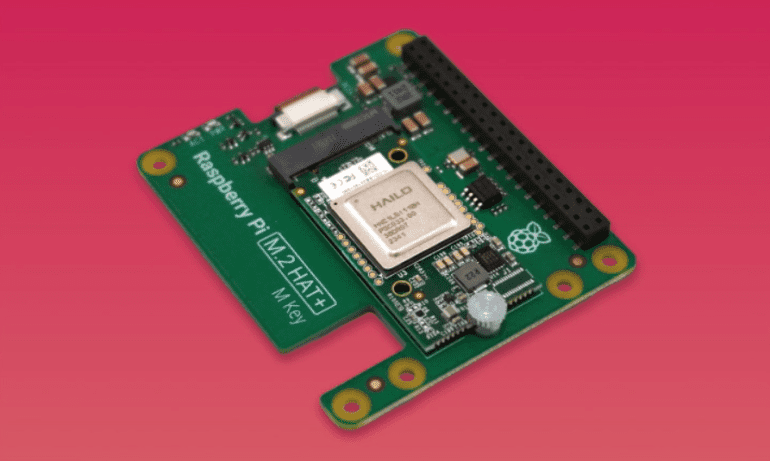- Raspberry Pi introduces AI Kit, a $70 extension pack for Raspberry Pi 5.
- Collaboration with Hailo brings Hailo-8L accelerator module for neural network inferencing.
- HAT+ extension card integrates M.2 slot via PCIe 3.0 interface for seamless connectivity.
- Raspberry Pi OS supports Hailo module and revamped camera applications for AI functionality.
- Kit enables diverse applications including object detection, segmentation, pose estimation, and facial landmarking.
Main AI News:
Raspberry Pi, renowned for its compact yet powerful computing solutions, has elevated its capabilities with the introduction of an AI extension kit. The latest iteration, Raspberry Pi 5, now doubles as an AI-driven computing platform, catering to both tech enthusiasts and industrial players alike. Released under the moniker ‘AI Kit,’ this $70 extension pack boasts a neural network inference accelerator, empowering local inferencing tasks.
This innovative extension is made possible through Raspberry Pi’s utilization of its HAT+ extension card architecture. HAT, an acronym for “Hardware Attached on Top,” embodies the simplicity and versatility of add-on cards for Raspberry Pi’s standard configuration. The HAT+ extension card integrates an M.2 slot, a ubiquitous interface in the realm of PC components. Technically inclined readers will appreciate its connectivity, linked to the Raspberry Pi via a single-lane PCIe 3.0 interface, operating at a commendable 8Gbps.
In a strategic alliance, Raspberry Pi has joined forces with Hailo, an AI chip startup that recently secured $120 million in funding, positioning itself as a formidable competitor to Nvidia. Hailo specializes in crafting chips tailored for AI-centric workloads on edge devices, spanning automotive systems, smart surveillance cameras, robotic platforms, and now, Raspberry Pi ecosystems.
The cornerstone of this collaboration is the Hailo-8L accelerator module, optimized for M.2 form factor deployment, seamlessly integrating with the HAT+. This module empowers Raspberry Pi 5 with inferencing capabilities reaching an impressive 13 tera-operations per second (TOPS). While it may not rival the computational prowess of Nvidia GPUs, its cost-efficiency and compatibility with Raspberry Pi’s standard 27W power supply make it a compelling choice.
On the software front, the latest iteration of Raspberry Pi OS boasts seamless integration with the Hailo module, enabling immediate utilization by the operating system and compatible applications. Furthermore, Raspberry Pi has revamped its suite of camera applications, now harnessing neural network inferencing within the camera pipeline. This integration unlocks a plethora of functionalities, including object detection, semantic and instance segmentation, pose estimation, and facial landmarking.
These enhancements not only augment Raspberry Pi’s utility in camera-related applications but also extend its potential to diverse non-camera use cases. As the community embraces this AI extension kit, the possibilities for innovation and exploration are boundless. Raspberry Pi empowers its users with a versatile tool, leaving the door wide open for creative experimentation and groundbreaking applications in diverse domains.
Conclusion:
The partnership between Raspberry Pi and Hailo signifies a significant stride in democratizing AI computing. By integrating the Hailo-8L accelerator module, Raspberry Pi amplifies its capabilities, making AI accessible to a broader audience. This collaboration not only expands Raspberry Pi’s market reach but also catalyzes innovation across various industries, heralding a new era of AI-driven solutions in the market.

